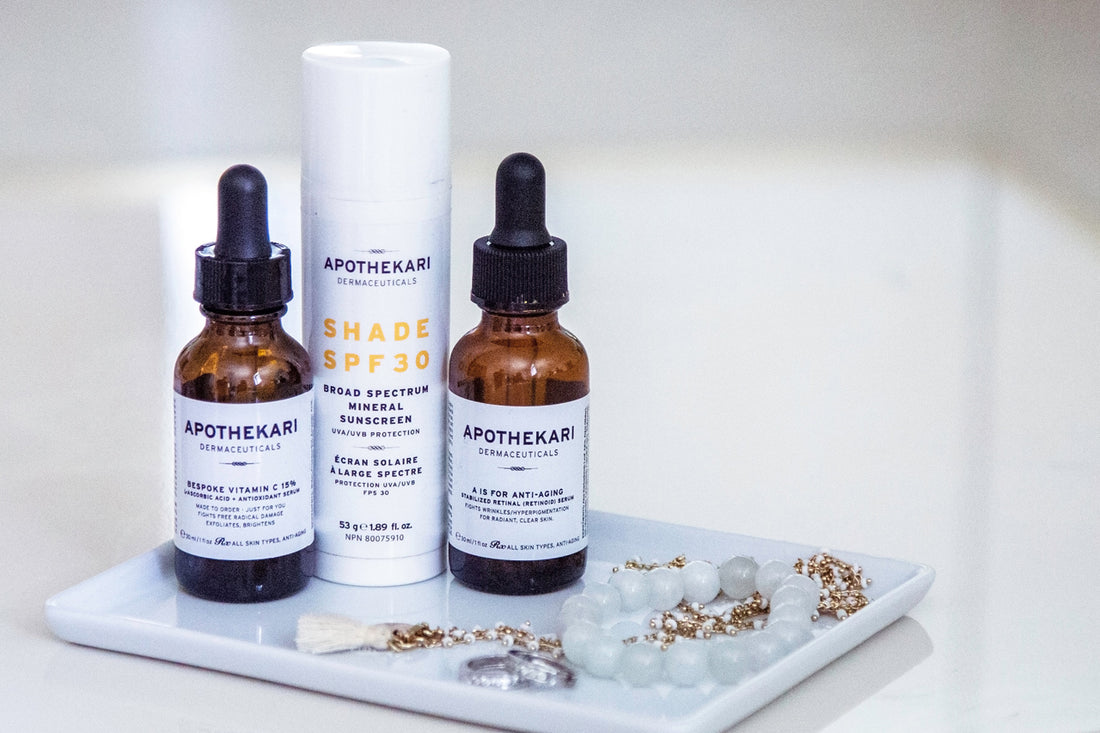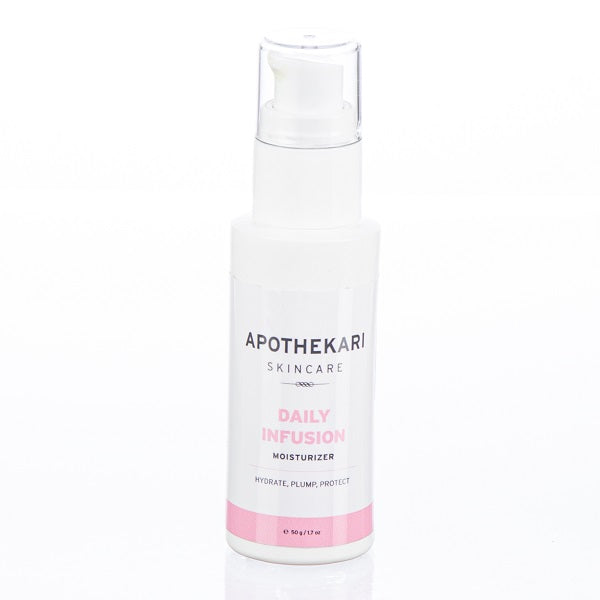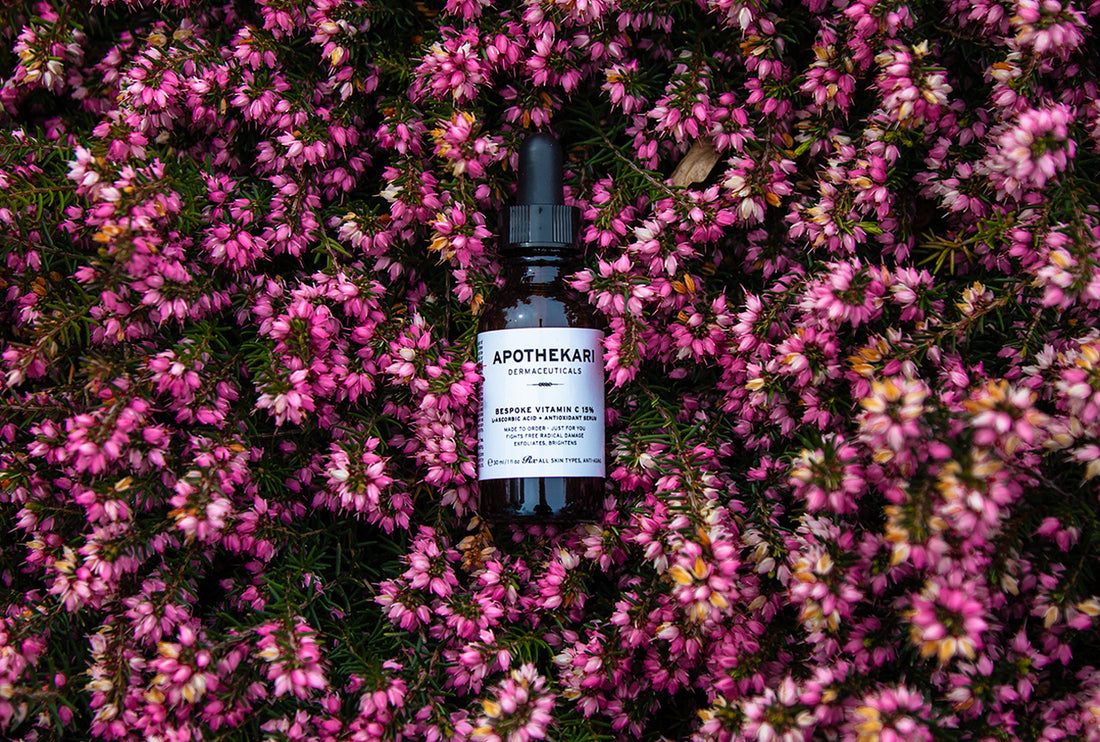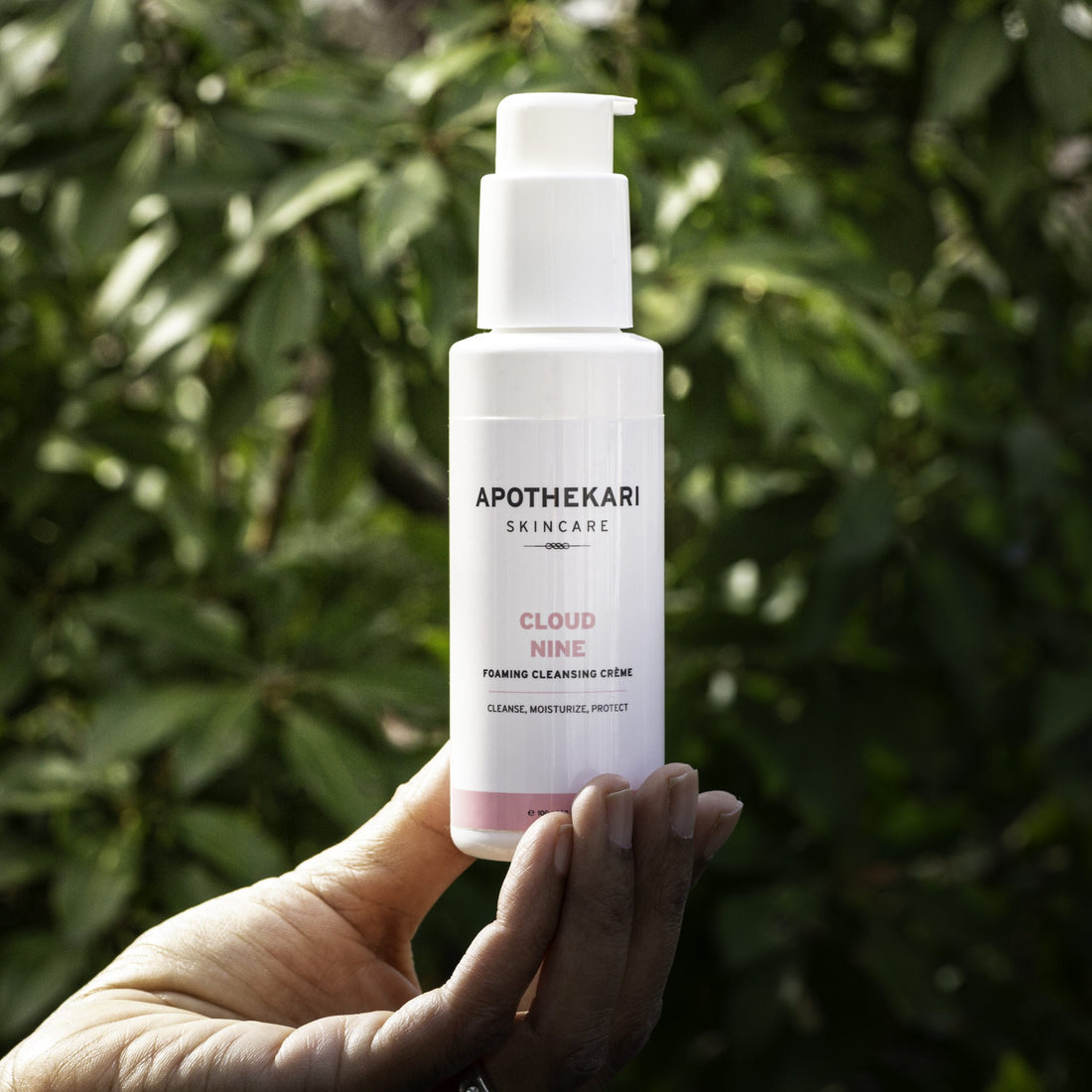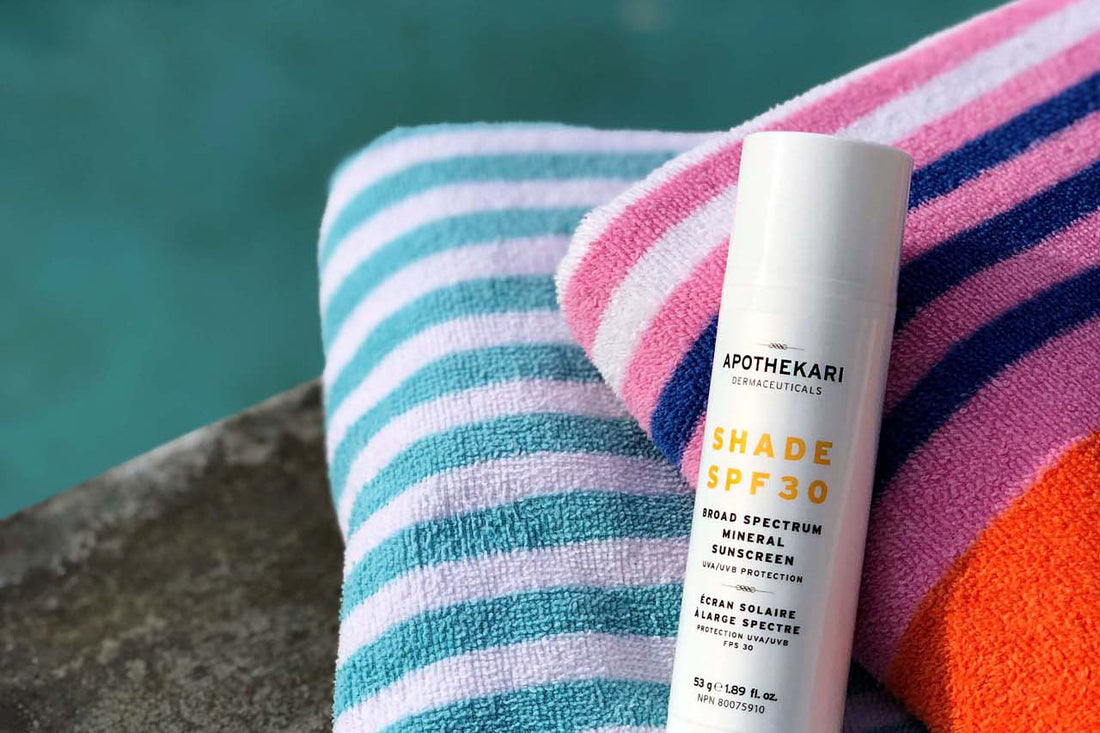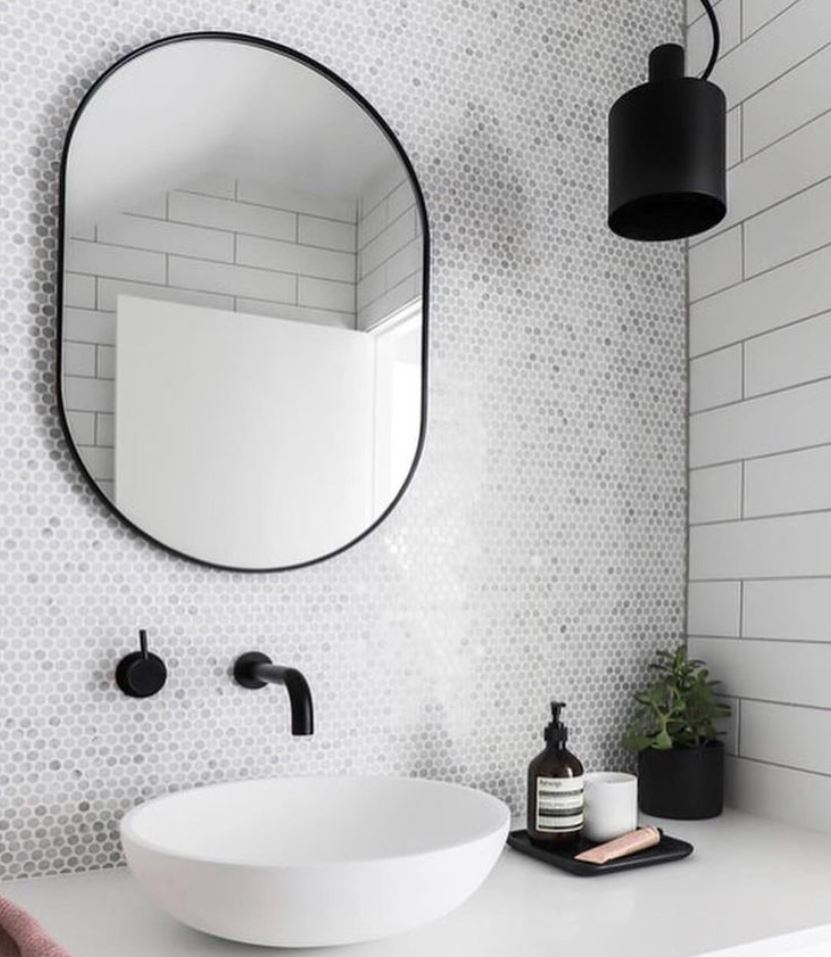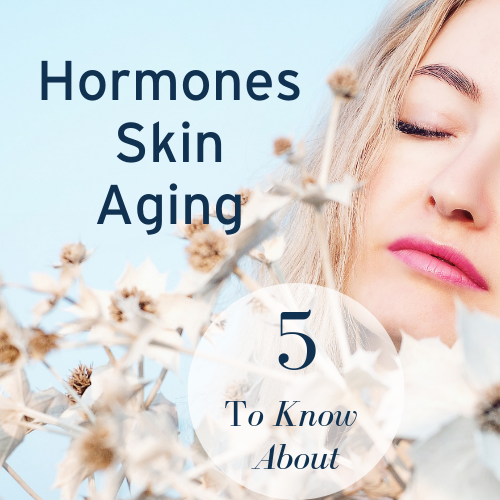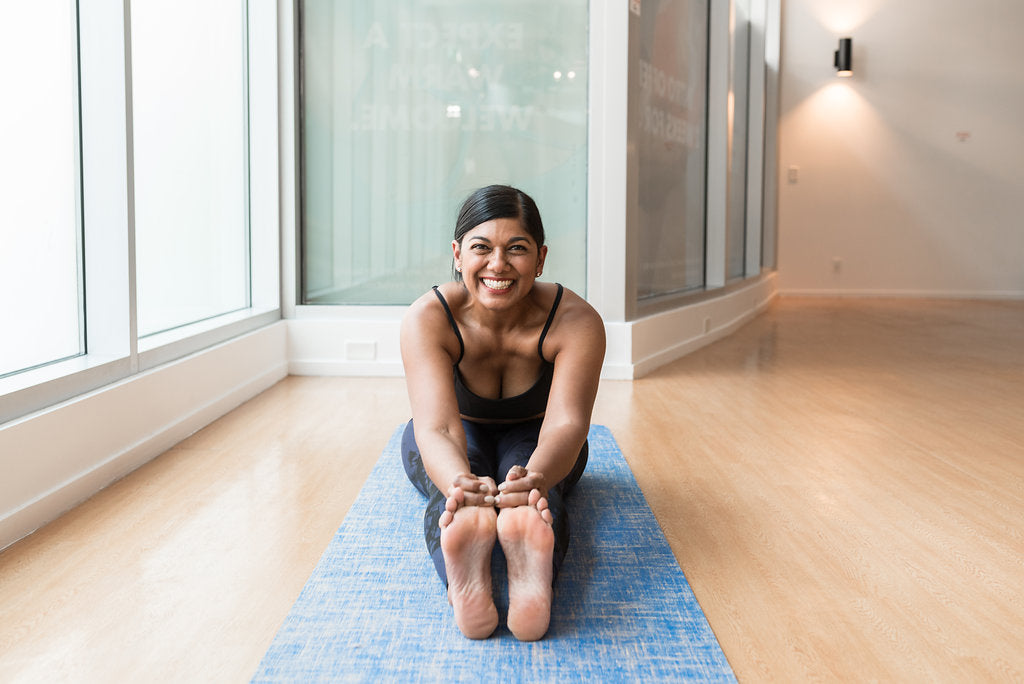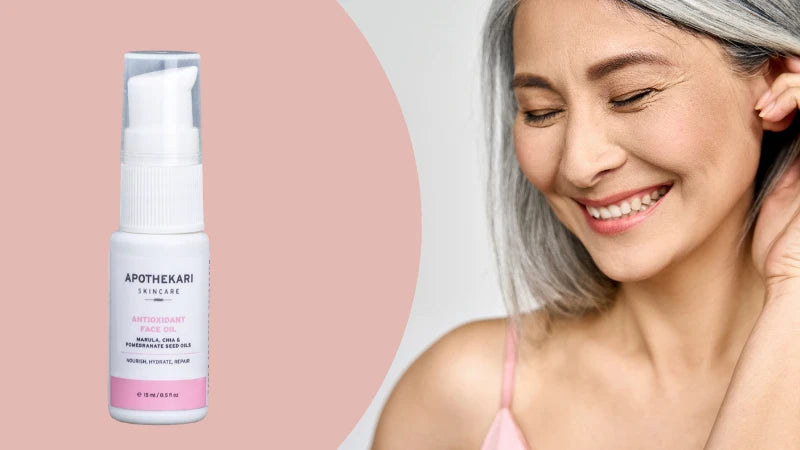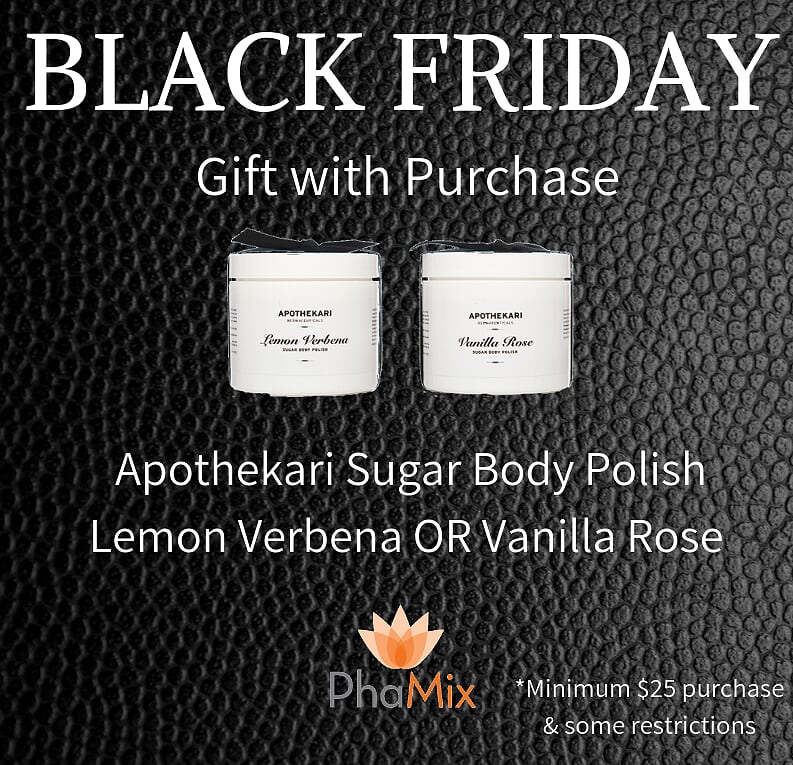Blog
All Skin Needs These 3 Anti-Aging Products
All skin benefits from 3 anti-aging products in order to keep it looking its very best – a sunscreen, an antioxidant treatment and a retinoid. In this post, we’re diving into why these products are so important if you’re interested in maintaining healthy and beautiful skin. (This set has been discontinued. Consider our Ageless skin set instead) Shop Apothekari Ageless Skin Set Here’s How Your Skin Ages Skin ages in two main ways – extrinsically and intrinsically – discussed in detail in an earlier post. Extrinsic aging occurs as result of things happening outside our bodies – UV rays, pollution, smoking & smoke exposure as well as diet and lifestyle. These factors are the biggest contributors to skin aging and can lead to thick and coarse skin, age spots and wrinkles. They can also influence the development of many types of skin cancer. Over time, ultraviolet light can damage elastin, collagen and glycosoaminoglycans (GAGs), proteins and sugars naturally found in skin and which help to keep it firm, supple, hydrated and line free. Intrinsic aging occurs naturally over a period of years and is related mainly to our genetic make-up along with hormonal and metabolic processes. If you’re interested to know more, we’ve written a detailed post on what happens to skin at menopause . Don’t be disheartened, though. If you’ve been dealt a bad hand when it comes to your genes, a healthy lifestyle, along with the right kinds of skincare products, can help to counteract many of the effects of your genes. All Skin Needs These 3 Anti-Aging Products Preventing skin damage is one of the best things you can do for your skin in the long term. Exposure to the sun’s rays is thought to be responsible for more than 80% of skin aging and ultimately leads to skin that is saggy, less resilient, wrinkled and possibly discolored. Anything you can do to protect skin from this damage is your best insurance against the effects of aging. Additionally, products that perfect skin to correct damage or imperfections are just as important. These 3 anti-aging products are the ones backed by clinical research and years of experience as offering the most benefit to skin: Sunscreen. A sunscreen that protects against both UVA (AGING) and UVB (BURNING) rays is essential to any skincare routine. Apothekari Shade SPF 30 delivers just that in a non-whitening, mineral based (zinc oxide), non-greasy formulation. Antioxidant. Antioxidants help to protect skin from damage caused by free radicals when we’re exposed to sunlight and pollution, for example. They should be applied to skin every morning along with sunscreen because they help boost the effectiveness of one another. You can find the most widely researched antioxidant, Vitamin C (as L-ascorbic acid) plus a range of other skin beneficial antioxidants such as ferulic acid, green tea, astaxanthin, alpha lipoic acid and pomegranate seed oil in our Bespoke Vitamin C Serum, made fresh for each order. Retinoid. We LOVE retinoids at Apothekari! Retinoids are a class of ingredients that are derived from Vitamin A and which include prescription retinoic acid and tazarotene plus over the counter options such as retinol and retinaldehyde. In addition to helping boost collagen and elastic production, they increase skin cell turnover (getting new, healthy skin cells to come to the surface), reverse sun damage and minimize the appearance of wrinkles and fine lines. We are big fans of retinaldehyde, which delivers results while being one of the gentlest retinoids, making it suitable for most skin types. Retinaldehyde also has antibacterial effects, making it a useful addition to the management of acne. Find retinaldehyde in A is for Anti-Aging, where it is combined with other skin beneficial ingredients. Are you ready to up your skincare game with these 3 anti-aging skincare products?
Learn moreA Light Face Moisturizer for Warmer Weather
If you’re looking for a face moisturizer for warmer weather, Apothekari Daily Infusion Moisturizer may be just what you’re looking for. In this post we’re discussing tips to help you find one that’s just right for your skin. Want information about moisturizers in general? Check out this post we wrote earlier. Shop Daily Infusion Moisturizer A face moisturizer is a product that we apply to skin to relieve dryness and make it feel more comfortable. They can range from lighter serums and lotions to heavier and thicker treatments such as petroleum jelly (although this isn’t something we’d recommend!). Water qualifies as a moisturizer, but because it evaporates quite quickly, it’s not very effective on its own. The ideal face moisturizer falls somewhere in between water and petroleum jelly and many customers find that a product like Apothekari Daily Infusion Moisturizer works perfectly for them all year round because it moisturizes without leaving skin feeling greasy. It’s also suitable for all skin types. Moisturizer Ingredients Moisturizers are made up of three main types of ingredients: Humectants. Deliver moisture to skin by either grabbing it from the environment or pulling it from the skin’s deeper layers (dermis) to its surface layers (epidermis). Hyaluronic acid (sodium hyaluronate), glycerin, propanediol, honey and propylene glycol are all examples. Emollients. Soften and smooth skin by filling in the gaps. May also lock in moisture. Fats and oils like vitamin E, cholesterol, jojoba oil and some silicones are emollients. Emollients may also have occlusive action. Occlusives. Work by forming a thin, oily layer over skin, helping to lock in moisture. They should be applied over damp skin, ideally. Lanolin, beeswax, petroleum jelly and fatty alcohols like cetyl alcohol and stearyl alcohol are occlusive. Some occlusives may also have emollient activity. The combination and amounts of each ingredient influence how light or heavy a moisturizer feels. A Face Moisturizer for Warmer Weather Humidity (the amount of moisture in the air) changes depending on where you live or the season. Tropical locations and summer often bring higher humidity while winter and desert or cooler climates tend to be drier. A heavy moisturizer (one with more emollient and occlusive ingredients) that was perfect for cooler winter temperatures may feel too heavy now. If you find that your skin is left feeling greasy or oily now that it’s warmer outside, it may be time to revisit the moisturizer you’re using. Opt for one that contains fewer occlusive ingredients and that contains more humectant ingredients. Our Daily Infusion Moisturizer has a good balance of humectants (glycerin), light emollients (caprylic/capric triglyceride, coco-caprylate/caprate, squalane) and occlusives (cetearyl alcohol, cetearyl glucoside, glyceryl stearate) to deliver light moisture that all skin loves. We refer to it as the ‘Goldilocks of Moisturizers’ because most of our customers feel it’s just right! Tips: In order to maximize the effectiveness of your moisturizer, keep the following in mind: Apply over damp skin to lock in moisture. Moisturize as often as you need to. Don’t forget sunscreen to help protect skin against damage from UV rays. Now you and your face are ready for summer!
Learn moreHow to Choose the Best Vitamin C Serum for Your Face
What is Vitamin C? If you’re serious about skincare, you likely know that vitamin C (as found in our Bespoke Vitamin C 15% Serum) is a must have in your routine and in this post, let’s help you find the best vitamin c serum for your face. Buy Bespoke Vitamin C 15% Serum Vitamin C belongs to a group of molecules known as antioxidants, substances which stop oxidation, a chemical reaction that results in the production of free radicals. Often referred to as ROS – reactive oxygen species – free radicals are harmful substances which can damage cells. The sun’s UV rays, pollution and cigarette smoke are some of the biggest contributors to the development of free radicals. Antioxidants like vitamin C are able to protect against free radical damage by donating one of their electrons to stop the chain reaction that results in damage. They do this without making themselves unstable. Damaged proteins, lipids and DNA in skin accelerate the aging process resulting in a change in skin structure. They can also trigger inflammation, leading to a breakdown of collagen. The end result? More wrinkles, fine lines, hyperpigmentation, saggier skin along with some types of skin cancer. Why You Need a Vitamin C Serum Our bodies manufacture some antioxidants, which deliver a range of body-wide benefits, but vitamin C isn’t one of them. In order to obtain adequate amounts of Vitamin C, it’s important to consume foods like fruits and vegetable (citrus fruits, guavas, bell peppers and kiwi fruit contain high amounts), which are rich in this important vitamin. Vitamin C is involved in many bodily processes: Collagen production Neurotransmitter production Plays a role in protein metabolism Assists with wound healing. Its antioxidant properties help limit the damage caused by free radicals and may help to prevent the development of certain diseases including cancer. A lack of vitamin C leads to scurvy, that condition experienced by sailors on long sea voyages in the mid-19th century. Vitamin C Skin Benefits Vitamin C is a normal part of the skin’s makeup, but aging causes a decline. Excessive exposure to UV light, pollution (including smoke and ozone) can also lower the skin’s Vitamin C content. While skin benefits from a vitamin C rich diet, skin care experts agree that topical application is the most efficient way to get good concentrations to skin where it helps in several ways: Limits damage caused by UV rays Contributes to collagen synthesis which helps to support skin Increases skin hydration. Studies suggest that vitamin C helps skin retain moisture by reducing transepidermal water loss (TEWL). Additionally, it may promote the synthesis of lipids, which helps to further protect against dryness. Skin Lightening/Brightening. Vitamin C reduces the production of melanin, which can help to lighten and brighten skin tone. How to Choose the Best Vitamin C Serum for Your Face L-ascorbic acid is the form of Vitamin C that has the most research to back up its skin benefits, but many other effective forms of Vitamin C are available as well. This includes ascorbyl glucoside, amino ascorbyl phosphate, sodium ascorbyl phosphate, tetrahexyldecyl ascorbate, magnesium ascorbyl phosphate, etc. All can help skin and should be evaluated individually when deciding which is the best vitamin c serum for your face. If you decide that the best vitamin C serum for your face is one that contains L-ascorbic acid, ensure that you purchase from a reputable brand. L-ascorbic acid, while highly effective, is also notoriously unstable. If a serum you are using contains this ingredient and is dark in colour or smells odd, don’t use it as it has likely oxidized and will be ineffective and potentially harmful to your skin. At Apothekari, each bottle of our L-ascorbic acid serum – Bespoke Vitamin C Serum – is made to order ensuring that every bottle is safe and effective for 6 -8 months after purchase. Vitamin C works best when combined with other antioxidants including Vitamin E, ferulic acid, green tea, resveratrol and coenzyme Q10, to name a few. Skin benefits most from formulations containing a combination of ingredients, which work together to deliver benefits. Wherever possible, Vitamin C serums should be applied in the morning prior to UV exposure as UV rays are one of the biggest generators of free radicals. Are you ready to choose the best vitamin C serum for your face?
Learn moreA Gentle Facial Cleanser for Spring
Spring has sprung (!) and what better time to talk about cleaning, especially as it pertains to our faces and in choosing a gentle facial cleanser to suit your needs. We may be seeing more sunshine, but cooler temperatures and lower humidity still, may dictate the use of more gentle products in your skin care routine. In this post we’re looking at different types of cleansers to help you determine if a more gentle facial cleanser is what your skin will benefit from this season. Shop Cloud Nine Foaming Cleansing Creme Cleansing is an essential part of an effective skin care regimen because it helps to remove dirt, oil and make-up and preps the skin to absorb treatments applied afterwards. How To Cleanse Regardless of which type of cleanser you choose, it’s important to cleanse correctly: Clean Hands. This helps ensure that you don’t introduce more dirt or bacteria to your face. Use Lukewarm Water: Hot water can dry or irritate your skin and cold water is not very effective at helping to loosen dirt or oil. Massage Gently. Use circular motions to cleanse avoiding rubbing or tugging too hard. Rinse Well. This helps to ensure you remove all traces of cleanser. You can also finish off with a warm washcloth, if that’s your preference. Pat Dry. Use a clean towel and be gentle. There’s no need to get every drop of moisture off. While the jury is still out on how often to cleanse, many agree that once or twice a day is best for most people. An evening cleanse before bed is necessary to remove, dirt and make-up but a morning cleanse can be skipped if your skin is dry and/or sensitive. If you wake with oily skin, you may wish to do a morning cleanse as well. Yes, Gentle Facial Cleansers Exist! Amaranth Plant (source of hydrolyzed amaranth protein for gentle cleansing) In a previous post, we discussed the 5 main types of cleansers you can choose from: Cream. Creams are generally the most moisturizing type of cleanser and ideal for dry, normal and sensitive skin. Apothekari Cloud Nine Foaming Cleansing Crème is an example of a cream cleanser. Gel. Lighter in texture than most other types of cleansers, gels often foam and may contain actives such as alpha hydroxy acids (AHAs) or salicylic acid. Apothekari AHA-Mazing Clean Gel contains alpha hydroxy acids to exfoliate and clean without stripping away natural oils. Cleansing Oil or Balm. Cleansing oils (liquid) and balms (solid) work as ‘magnets’ to attract impurities like dirt and oil away from skin. They are often used as a first step in the ‘double cleansing’ method. Micellar. Water-based and non-soap, micellar cleansers are made up of tiny molecules (micelles) that attract dirt and debris without disturbing the skin’s natural oils. They make excellent make-up removers. Powders. Powders are a dry mixture of oil-absorbing and exfoliating granules. They are designed to be mixed with water to cleanse and exfoliate. How To Choose a Gentle Facial Cleanser All cleansers help to remove dirt and oil with the difference being in HOW they achieve that. Creams, oils and balms tend to be suitable for normal to dry skin. Gels and powders are great for combination and oilier skin while micellar cleansers generally can be tolerated well by all skin types. For many of us, the lower temperatures and lower humidity associated with winter and spring may lead to drier skin so for this reason, a gentle facial cleanser may be a good choice right now (and year round). Look for formulations that contain: Mild surfactants (surfactants help with foaming). Strong surfactants like sodium laureth sulfate tend to be quite drying for most skin types so avoid if you can Emollients like Cetyl Alcohol, which help to soften and soothe skin Humectants like glycerin to help attract moisture Apothekari Cloud Nine Foaming Cleansing Crème is a mild and moisturizing cleanser that contains a natural mild foaming peptide derived from organic amaranth. It also contains antioxidant and anti-inflammatory ingredients to not only clean, but also moisturize and protect skin. Suitable for all skin types, including sensitive skin and individuals with rosacea, we love how it foams and cleans without stripping skin. It’s our go-to cleanser during the cooler months of the year.
Learn moreMenopause: Hormones & Your Skin
If you’re a woman and have reached a certain age, it’s inevitable that you’ll go through menopause. This normal and natural part of the aging process is experienced by all women as they get older and impacts your health, including that of your skin. In this post let’s look at how to keep your skin looking its very best. It’s Your Hormones! In a previous post, we talked about five main hormones that can impact skin – estrogen, progesterone, testosterone, cortisol and insulin. Hormone levels fluctuate depending on a range of issues including stress, diet, sleep, our genes and menopause. At menopause – and the lead up period, perimenopause – a decline in estrogen levels is most implicated with skin health with progesterone and testosterone playing a smaller role. Estrogen. Estrogen seems to have an impact on skin in several ways: It is needed to produce collagen, a protein involved in the skin’s structure and which helps to keep it firm and thick. It has also been shown to boost the production of elastin, a fiber that helps give skin its elasticity. The combined action on elastin and collagen lessens the appearance of wrinkling and helps to keep skin firm and tight. Estrogen helps to maintain skin moisture by increasing the production of hyaluronic acid and can possibly help skin retain its ability to protect against external irritants. Progesterone. Although this hormone isn’t associated with skin health as much as estrogen, declining levels of progesterone are associated with a reduction in skin elasticity, leading to skin sagginess. Testosterone. Unlike estrogen and progesterone, women may experience an increase in testosterone at menopause leading to oilier skin and more breakouts. What Happens to Skin at Menopause These are the main skin changes that women may notice at menopause and beyond: Drier Skin More Wrinkled Skin Saggier Skin Thinner Skin Some women may experience oilier skin with increased breakouts due an increase in testosterone production. How to Treat Skin at Menopause Skin benefits from gentle, effective products and a consistent routine regardless of what life stage you’re at. At Apothekari, we subscribe to a 3 step skin care routine, which benefits most women. In addition to gentle cleansing, an effective UVA/UVB blocking sunscreen and topical antioxidants applied every day, it’s important to manage the skin issues particular to an individual. Whether it’s dryness, hyperpigmentation, wrinkles or age spots, it’s important to find and use the correct products on a regular basis. At menopause, retinoids (a class of ingredients derived from Vitamin A) are non-negotiable because they offer so many benefits to skin: Boost collagen production to minimize the appearance of wrinkles and fine lines Increase the skin’s moisture content and reduce TEWL (transepidermal water loss) to minimize skin dryness Decrease melanin production resulting in a more even and brighter skin tone. Unfortunately, while retinoids are highly effective in helping to minimize the skin changes that many women experience at menopause, they can also be highly irritating. That’s why we are so excited to offer A is for Anti-Aging, our retinoid serum formulated with retinaldehyde, which is the gentlest form of retinoid, while still being highly active to skin. Many of our customers previously unable to tolerate other forms of retinoids like retinol or prescription retinoic acid, can use A is for Anti-Aging because retinaldehyde doesn’t irritate or burn skin. If you’re ready for healthy & beautiful skin at menopause, consider A is for Anti-Aging and find out for yourself why we have so many happy and repeat customers. If you’ve still got questions, get in touch. We’re always happy to help you find the right skin care products to meet your needs.
Learn moreA Naturally Safe Sunscreen for Spring Break
In this post, we’re discussing a naturally safe sunscreen for spring break including some tips on how to choose one and use it for maximal benefit. A Safe Sunscreen: For A Snow or Sun Break If you live in most parts of North America or Northern Europe, it’s the time of year when a little getaway is just what many of us are craving! Whether you’re a winter person or a summer one (us over here), you’re going to need a sunscreen for your vacation. And although you may question the necessity for sun protection if you’re planning a ski holiday, bear in mind that the sun’s UVA rays (those ones associated with aging) are prevalent year-round, regardless of season. Additionally, snow is very reflective (4 times more so than sand) and UV light also increases with altitude, so it is possible to not only damage the skin, but also to burn. Regardless of your destination – beach or ski slope – an effective and safe sunscreen is non-negotiable. Choosing a Safe Sunscreen: Physical or Chemical Now that the travel arrangements have been organized, it’s time to choose a sunscreen, a choice that can be overwhelming given the multitude of products available for you to pick from. Your first decision is to decide between a chemical or a physical sunscreen, or one that contains a combination of both types of ingredients. Chemical sun filters work by absorbing UV rays and converting them into harmless energy. Physical sun filters work primarily by blocking or deflecting UV rays but they may also absorb UV rays as well. The choice is yours when it comes to a formulation and neither is right or wrong; it’s down to a matter or personal preference. When it comes to SPF, look for a minimum of SPF 30, recommended by most skin care experts. Many of us looking for a safe sunscreen, opt for ones that contain physical blocking ingredients like zinc oxide or titanium dioxide. Zinc oxide is a soothing ingredient and a great choice for sensitive skin. It is also the sun filter shown to be most protective for hyperpigmentation so is a good choice if you have melasma or dark spots. Apothekari Shade SPF 30 is formulated with ZinClear, a form of zinc oxide that goes on clear (no white, ghost-like effect here!) and delivers protection against both UVA and UVB rays. It also contains antioxidants to help deliver additional protection against UV rays. It’s the sunscreen that always travels with us at Apothekari! Keep in mind that Shade SPF 30 is not water resistant. If you need a water resistant formulation, shop our full range of sunscreens over at our partner site PhaMix.com. Application Tips for Sun Safety Now that you’ve chosen a safe sunscreen, it’s important to apply it correctly. Here’s how: Apply BEFORE going outside – allow about 15 minutes. Apply enough. Studies have shown that most of us don’t use enough sunscreen to get the labelled SPF benefit on the box. Be generous with application (a shot glass for the whole body; about ½ teaspoon for the face). Don’t forget areas like the tops of your feet, lips and ears. Reapply. Especially if you are swimming or sweating, apply every 2 hours. All set? Where are you going?
Learn moreA 3 Step Skin Care Routine, Especially Through Menopause
When it comes to putting together a skin care routine through menopause, we’ve got you covered! There’s no shortage of advice on the internet about how to put together a skin care plan, regardless of the stage of life you’re at. Ranging from the 10 Step Korean Skin Care Regimen to 7 Step Schedules and whittled down versions as well, the confusion is understandable. Do we really need 10 steps? Can we get away with just one? Shop Aha-Mazing Clean Gel Cleanser Shop Cloud Nine Foaming Cleansing Creme SHOP RADIANT SKIN SET Like you, our time is precious, so anything that involves too many steps isn’t going to cut it. 7 is a stretch and 10 is most definitely too many! We’d love to tell you that you could get away with just one, but alas, that would be a fairy tale and over here, we’re all about keeping things real. While we’ve blogged previously about 4 steps to great skin, we’ve managed to whittle it down to a doable 3 steps. We hope you’ll agree that this is manageable indeed. Why You Need a Skin Care Routine Great skin comes down to two main factors – your DNA PLUS your daily habits. If you won the gene pool lottery, then lucky you. However, it’s important to acknowledge that one can’t rely completely on a genetic advantage when it comes to skin. Conversely, if your genes are against you, all is not lost. A well thought out and regular skin care routine can have a big impact on how your skin ages regardless of your genes. Of course, what constitutes a good routine can differ depending on who you speak to. It’s no wonder that many of us may be left feeling completely confused and unsure about where to begin. Caring for your skin shouldn’t be (and really isn’t) all that complicated. You just need to know the right steps to follow. Through menopause, many women struggle with dryness while others experience acne, even if it’s not something they’ve had to contend with before. You may feel as if you’re reliving your teen years again! Hormonal fluctuations are responsible for many of these skin changes so it may be necessary to revisit your skin care routine and consider changing up the products you’re using. By selecting and using products best suited to your individual needs and ensuring that you follow a well thought out skin care routine, you’ll be well on your way. Let’s get to it. The 3 Steps Everyone Needs Here are the 3 steps everyone needs in their skin care routine: Step 1: Cleanse Step 2: Protect Step 3: Perfect Step 1: Cleanse Cleansing is an important and often neglected part of a skin care routine. Beyond removing make-up, dirt and oils from your face, cleansing helps to provide a clean skin surface, allowing any products that you apply on your skin to be absorbed better. Cleansing also helps to reduce blemishes, redness and irritation, which may be caused by an accumulation of make-up, pollution, dirt and oil. It’s a matter of personal preference whether you choose a one-step or two-step cleansing method. Over here, we go back and forth between the two, depending on the time of year, how our skin feels, how much make-up we’ve applied and also by how lazy we feel! (It’s not a good reason, we agree. But, we also recognize that we’re human). We offer two cleansers at Apothekari. Cloud Nine Foaming Cleansing Crème may be used by all skin types, including individuals with sensitive skin or rosacea. It’s a very gentle cleanser and if you’ve found your skin getting drier and/or more sensitive, it’s a good one to consider. AHA-Mazing Clean Exfoliating Cleanser Gel, provides gentle exfoliation and foaming action with a triple combination of alpha hydroxy acids (AHAs). If you prefer more sudsing action or your skin is on the oilier side or you have acne, then this is the cleanser for you. It may be used by all skin types, but caution should be exercised if your skin is overly sensitive skin or if you have rosacea. Step 2: Protect We’ve all heard the saying, “An ounce of prevention is worth a pound of cure” and this holds true when it comes to your skin. Prevent skin damage by protecting your skin with the right ingredients and your skin will reap the rewards for years after. Two types of ingredients are important to know about when it comes to protecting skin – antioxidants and sunscreens. Antioxidants include ingredients like Vitamins A, C and E, green tea extract, pomegranate seed oil, coenzyme q10, etc. They exert their action by helping to prevent skin damage associated with free radicals, unstable molecules that are formed by exposure to the sun’s ultraviolet (UV) rays and pollution, amongst other things. Free radicals lead to a range of unwanted effects including hyperpigmentation and collagen destruction, associated with lines and sagging. Antioxidants can also help boost the effectiveness of your sunscreen. Sunscreens protect skin by minimizing damage caused by UV rays, which are thought to be responsible for more than 85% of skin aging. Hands down, wearing sunscreen daily is one of the most important things you can do to keep your skin looking its best. You can choose between a chemical or physical blocking sunscreen and the choice is up to you. Well formulated and effective products are available in both categories. We’re big fans of physical sunscreens formulated with zinc oxide because zinc is a very soothing skin ingredient and the only sun filter that delivers protection against the full spectrum of UVA and UVB rays. We know you’re wondering…. is it possible to find a product that combines a sunscreen with antioxidants? Yes, it’s possible to find sunscreens that contain antioxidants and Shade SPF 30 is one. However, most sunscreens don’t contain levels of antioxidants high enough to deliver the maximum protection against free radicals. For the greatest benefit, most experts recommend that you apply both an antioxidant formulation (consider our Bespoke Vitamin C Serum 10 or 15%) and a sunscreen in the morning. Generally, apply the antioxidant first, followed by sunscreen. Step 3: Perfect Once you have the basics of Steps 1 and 2 covered, it’s time to look at your specific skin needs. This will differ depending upon your age, your ethnicity and even where you live (climate, humidity, etc). Whether, you’re worried about wrinkles and fine lines, crows feet, dark circles, hyperpigmentation, dry skin or acne, Step 3 focuses on that. It’s important to find and use treatments that are designed to address your skin’s specific problems. You can choose from a range of products including moisturizers, eye treatments, skin brighteners, acne remedies and various serums. Some treatments, like sunscreens, are designed to be applied during the day. Others, like retinoids (which tend to degrade when exposed to sunlight, are best used at night). Antioxidants, moisturizers, eye creams, skin brighteners etc may be used day and/or night. Whatever you use, give the product a fair chance to make a difference. New skin cells turn over once every four to eight weeks so you need to wait at least that long to determine if the product is working. Regardless of your specific skin needs, one ingredient that’s a must for anyone concerned about healthy and beautiful skin, is a retinoid. Retinoids are derived from Vitamin A and deliver a range of skin benefits including: increasing collagen and elastin production to fight wrinkles, fine lines and skin sag; skin brightening effects, an increase in skin moisture content and a reduction in oil production. They not only help to improve the skin’s appearance, but can also reverse damage caused by the sun. Additionally, retinoids have anti-acne properties, making them a useful addition in the management of acne, which strikes many women through menopause. Apothekari A is for Anti-Aging contains retinaldehyde – a form of retinoid that offers effective yet gentle treatment. It’s well tolerated by most skin types, especially if introduced gradually into your skin care regimen. We know you have lots on your plate; we do too. That’s why we feel that 3 steps in your skin care routine are all you need to achieve healthy and beautiful skin at menopause or at any other phase of your life. Let’s keep things simple and uncomplicated AND with great skin to show for it!
Learn moreHormones, Skin & Aging: 5 Hormones You’ll Want to Know About
As you get older, you may be wondering about the connection between hormones, skin and overall wellness. And while there’s more talk about the topic these days, it’s still important to understand the intricate relationship between hormones and your skin’s health. So, let’s get to it! Shop All Apothekari Can Hormone Imbalance Cause Skin Problems? As we get closer to perimenopause and menopause, the hormone balance starts to change so you may start to notice a difference in the way your skin looks and feels. Hormones are chemical messengers, which tells cells–including skin cells–what to do. So when their balance is upset, you may very well notice a difference in your skin’s complexion. How Do Hormones Affect the Skin? There are many hormones in the human body and each play different roles when it comes to your health. In this post, we’re looking at five key players: estrogen, progesterone, cortisol, insulin, and testosterone, that can have an impact on your skin. Each one plays a unique role, but it’s also important to appreciate that they can have combined impact on your skin. Estrogen and Skin Aging. Our leading lady, estrogen, orchestrates the stages of puberty, pregnancy preparation, and overall skin vitality. However, estrogen gracefully takes a step back as we get older, leading to dryness and leaving our skin looking older. Stress and insufficient sleep–two factors that often come into play during the menopause transition–also influence estrogen production, which can impact the skin’s aging process. Progesterone and Skin Elasticity. Enter progesterone, the hormone which helps to enhance skin elasticity and blood circulation, ensuring that skin stays nourished. Yet, as time marches on, progesterone also starts to decline, leaving your skin looking lackluster. Menopause, stress, and health conditions all have the potential to disrupt the production of progesterone, and which can contribute to changes in skin texture. Cortisol: The Stress Hormone. Meet cortisol, often referred to as “stress hormone”, and which wreaks havoc not only on our mental state, but also can stage an aging performance on your skin. Studies reveal that stress-induced collagen loss, can lead to skin sagging, thinning and dullness, all resulting in a less vibrant complexion. Stress management is not only a wellness mantra; it’s also a crucial skincare strategy. Insulin and Skin Health. You may not think that insulin has much impact on how your skin looks, but it absolutely has an impact. Released in response to sugar consumption, insulin regulates blood sugar levels. High glycemic foods–you know, those cookies, donuts and sugary treats that many of us crave–might trigger insulin spikes, potentially impacting sleep and contributing to skin wrinkling. A gentle reminder that even our diet influences skin well-being. Testosterone and Skin Troubles. Whether in women or men, an abundance of testosterone might lead to unwanted acne. Aging introduces a double-whammy twist–women experience an increase in testosterone, which can bring about an increase in breakouts, while also experiencing a decrease in estrogen, resulting in drier skin. Does Balancing Hormones Help Skin? It makes sense that balanced hormones would be just the remedy that picky skin would benefit from. However, this is still a controversial topic in the field of medicine. If you feel that it’s something that you want to explore, check in with your doctor to discuss options and whether it makes sense for you. How Can I Balance My Hormones for Clear Skin? While your hormone levels can be up, down and all over the place as you get older, especially during the menopause transition, you can influence their levels to some extent. Focus on prioritizing good nutrition, stress management, regular exercise, and sufficient sleep. These will not only benefit your overall wellness, but your skin’s health as well. Which Hormone is Responsible for Glowing Skin? In our pursuit of radiant skin, we can’t overlook an unsung hero–melatonin. Produced in both your brain and skin cells, melatonin regulates sleep-wake cycles and acts as a potent antioxidant, helping to protect our skin against damage caused by free radicals. Studies regarding the use of topical melatonin are mixed as the hormone has been implicated in skin darkening because it activates melanocytes, the skin’s pigment cells. If you want to supplement with melatonin it’s best to take it internally rather than applied topically. While topical melatonin studies yield mixed results, internal supplementation is recommended for its potential benefits. What Hormone Causes Bad Skin? Identifying the culprit behind problematic skin brings us back to excessive testosterone. Whether in women or men, an abundance of testosterone might lead to unwanted acne. Your body deserves a thoughtful approach. Aging is inevitable and with it, comes many changes–those you can see and some that you can’t. When it comes to your skin, there are many safe and effective products that you can use to help combat the impact of changing hormone levels. Consider our Radiant Skin Set or our Ageless Skin Set, which are a great way to get you started on a skincare routine that can make a difference. And if you’re still not sure what to do, consult with your doctor or pharmacist. Aging doesn’t have to mean the loss of healthy and beautiful skin. Ask for help if you need it.
Learn moreHow to Set Skin Care Intentions for 2019
Ever wonder about resetting habits—like skincare intentions—for a New Year? May sound a bit woo, but bare with me, self care is essential to ensure your wellbeing. And what better time to make it a priority than the start of this year? While I’ve abandoned New Year’s Resolutions, which often end up seeming difficult once we reach mid January, these days I’m leaning towards more simple and achievable goals which are easier to stick to and more achievable. For this first blog post of 2019, let’s kick things off with a slightly more mindful post focusing on skin care intentions. And before you think I’ve gone TOTALLY woo woo on you, we’re still going to be discussing skin care but looking at it in a slightly different way. While there are companies that meditate over and bless their products while chanting and playing music before they are packaged and shipped to customers and retailers, I’m not convinced that’s the path for Apothekari. (However, never say never!). Our intention at Apothekari is to cut through the confusion, simplify the process and deliver skin care treatments formulated with ingredients that have scientific proof to back them up. Nevertheless, I recognize that what we put on our skin not only nourishes our skin, but also can play a role in our emotional well-being. The sensory experiences of aroma and touch associated with skin care have a connection to our inner beauty that cannot be discounted. When we approach skin care as part of our self care, we accept it as a way of feeling good about ourselves rather than as a chore or as an indulgence. 3 Skin Care Intentions for 2019 For 2019, I’m focusing on 3 ways to be more mindful when it comes to the care of our skin: 1. Think About What You Eat As the body’s largest organ, our skin reflects what we put into our mouths. I’m not sure about you, but after consuming way too much sugar, an abundance of heavy dinners and alcoholic cocktails, my skin often reflects the culinary abundance by the time the New Year rolls around. My body craves warm bowls of nourishing soups, crisp vegetables and leaner fare. I find that a structured eating plan makes perfect sense for the New Year. I’ve embarked on the Whole30 Challenge in past years, but this year I’m focusing on being more mindful about what I eat and appreciating the impact that this has on the health of my skin and overall wellness. Whatever works for you – a juice cleanse, calorie counting – it’s about paying attention to how your body reacts to your food choices. 2. Get Moving In a previous post I’ve discussed a study that showed that it’s not just our hearts that benefit from exercise. Researchers have demonstrated that premature aging in nearly every organ in the body, including the skin, was completely prevented in mice that ran on a treadmill three times a week for five months. My ‘thing’ is hot yoga, a practice that I took up nearly six years ago and which has helped me to build strength and flexibility and also to find calm. “Exercise truly is the fountain of youth.” 3. Stick to a Routine Despite how tired you may feel when you fall into bed, establishing and STICKING to a skin care routine is paramount to success. As with most things in life, consistent action produces results – one can’t expect to try a product just once or twice and expect to see a dramatic transformation. You’ll achieve far more benefit from a long term plan than you will with a week-long “miracle treatment.” It’s not just topical products that have an effect on your skin’s health, it’s about investing beyond that in a nurturing and intentional way. This year, by telling and showing your skin (and the rest of your body) that you care via your actions, you may find your skin responding in ways you didn’t expect. And if that’s a bit woo-woo, well then so be it!
Learn more4 Tips To Help You Survive the Holidays
I know that I’m not alone in feeling that as lovely and magical as the holiday season is, that it’s kind of sad that we need tips to survive the holidays! Let’s face it, this season also brings with it more stress than many of us wish for. We’re already familiar with the impact of stress on our health and the negative long term implications for our well being so in this post, let’s look at 4 tips to help us survive the holidays so that it’s as merry as can be. Shop All Apothekari Here’s How to Survive the Holidays 1. Take Some Time Out Whether it’s a spin class or yoga, a power nap or an afternoon in with a mug of hot tea and a good book, let this be JUST FOR YOU. Allow yourself time to rest and recharge so that you can tackle all things on your list with more calm, energy and enjoyment. 2. Eat Well I know I’m not alone when I say that my diet suffers terribly during the holidays. This food focused season filled with an overload of sugar, cheese and alcohol makes eating well challenging for even those of us who are good most of the year. The best advice here is to try not to overdo it. Eat the cookies, enjoy that cocktail and the sumptuous buffet. The key is to try to do this in moderation (easier said than done, I know). But regardless what happens, don’t beat yourself up. The holidays will soon be a distant memory and you’ll soon be able to focus on food that nourish your body again. 3. Manage Social Obligations Dinners with relatives, drinks with friends and business functions – all can be enjoyable, but when they’re packed into a short time frame, they can be both mentally and physically exhausting. While many social gatherings are unavoidable, if you’re worn out or too tired, it’s OK to decline the invitation. You can also opt to leave early, after popping in for a drink and to say hello. Your mental well-being is the most important thing here and good friends will understand. 4. Simplify Shopping There is nothing more stressful than trying to come up with gift ideas that show you really care. EXCEPT, fighting your way through the throngs of holiday shoppers trying to do same thing as you. Does anyone really need another scarf or centerpiece bowl? Unless you know that someone is really coveting something, simplify gift giving. Opt for gifts of food (a favourite bottle of wine, spices, condiments), which are always well received. Activities, including a dinner out or in, a movie night or drinks out with your most special people are sure to be appreciated more than a material thing. Why is Self Care Important During the Holidays? The holidays are meant to be a special time, enjoyed with those you love and focusing on celebratory foods and activities. But, those things don’t happen by themselves. Behind the scenes, someone is up till midnight baking cookies, wrapping presents or decorating the house. Over the years I’ve come to realize that I was the cause of much of the stress I felt during the holidays. My family didn’t care about the perfectly decorated tree, the home baked everything or the presents that were wrapped just so. I’d read too many magazines and blogs and followed too many influencers who made me feel like I was letting everyone down. Yes, there’s work involved, but nothing has to be PERFECT. Outsource, do less and do without so that you can enjoy the season as well. Your sanity—and your health—are more important than trying to keep up with unrealistic expectations. Your friends and family (those that really matter) care most about YOU. Focus on that rather than all the extra stuff that doesn’t bring much happiness to anyone. Indulge in a bit of self care so that you not only survive, but enjoy the holidays that you worked so hard to make special.
Learn moreCurious About How to Use a Face Oil? 4 Tips
If you’re curious about how to use a face oil, you’re not alone. They’re are cropping up everywhere these days and just in time for cooler temperatures and lower humidity, when our skin suffers more from dryness, we’ve just introduced our new Apothekari Antioxidant Face Oil. Formulated with Olkerii Marula Oil plus other skin nourishing vegetable oils including chia, pomegranate seed and crambe seed along with essential oils, it delivers fatty acids, sterols and antioxidants to calm, heal and protect skin. It is fast absorbing, suitable for all skin types and formulated to promote soft, radiant skin, protect skin from dehydration, while encouraging skin rejuvenation and reducing inflammation. Customers are telling us that they love our face oil because it has a light emollient (skin smoothing) effect without any greasiness. And they are raving about its divine scent. Shop Antioxidant Face Oil How to Use a Face Oil Depending on the formulation of your oil, it can be suitable for all skin types. That’s a topic for another post, but in this post I’m sharing some tips on how to use a face oil in order to maximize its benefits. Face oils provide emollient and/or occlusive (blocking) action making them ideal to help moisturize skin, but they can’t do it all by themselves. They DON’T hydrate skin. Despite what you may have been told, face oils are not moisturizing. For that effect, you need a product that contains water or a humectant – ingredients that help to increase or draw moisture to the skin. This includes ingredients such as glycerin, propanediol or sodium hyaluronate/hyaluronic acid. Face oils work best used in conjunction with ingredients and/or products that can hydrate skin such as moisturizers and or serums. Less is more. You don’t need to apply a lot—just a few drops are enough to deliver the benefits. When Should I Apply Face Oil to My Routine? Apply as the LAST step in your skin care routine. Many individuals have told me that they apply a face oil as the FIRST step in their routine after cleansing. Due to their occlusive effects, face oils are best applied over top of a hydrating product like a moisturizer or serum to help prevent evaporation, lock in the moisture and ensure that it reaches the skin’s deeper layers. If you’re not using Apothekari Antioxidant Face Oil, are you using another? Do tell.
Learn moreBlack Friday 2018
During our Black Friday promotion, choose one of our luxurious Apothekari Sugar Body Polishes with a minimum $25 purchase online! Between Wednesday, November 21st to Saturday, November 24th, every order placed on PhaMix.com of $25 or more qualifies for a FREE GIFT* of a full-size Apothekari Sugar Body Polish in either Lemon Verbena or Vanilla Rose! Enter your preference of either lemon verbena or vanilla rose in the comments section. We would be happy to choose one for you if a selection is not indicated or if supplies run out of your chosen polish. *Limited to one gift per purchase. No cash value. Promotion does not apply to past purchases. While supplies last. Black Friday is all about finding the ideal gift for everyone on your list. This year, why not include yourself? Apothekari Sugar Body Polishes are perfect for a little holiday indulgence. Made with a base of shea and olive fruit butters combined with virgin coconut oil, they will leave the skin feeling soft and well-moisturized yet not greasy. And because we know you’re not the kind of person to keep a good thing all to yourself, Apothekari Shea Body Butter and Bamboo Lemongrass Foaming Body Polish also make excellent gifts for those extra special people on your list. If you want to really impress them, consider our new, limited edition Apothekari Rejuvenating Oil Elixir. We love how it absorbs quickly, hydrates and smells divine!
Learn more
